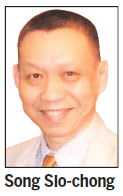HK needs to change attitude to visitors
Updated: 2014-06-09 07:10
By Song Sio-chong(HK Edition)
|
|||||||
Hong Kong is facing a dilemma over the influx of mainland tourists coming here under the Individual Visit Scheme (IVS).
Of course, many people recognize the value and benefits the scheme has brought to Hong Kong's economy since it was implemented in mid-2003. Last year, more than 41 million mainlanders visited the SAR - more than 28 million through this scheme. Mainland tourists have contributed much towards generating revenue and employment opportunities in the retail industry. Without this, we would probably have experienced another economic recession similar to that of 2003.
But the scheme has also been widely criticized by local people. They complain about streets, shops and public transport being over-crowded because of too many visitors from the mainland.
Demand for many items in Hong Kong shops has increased, putting pressure on rents, while inconveniencing local consumers who must compete for those categories of goods popular with shoppers from the mainland.
Some political activists have launched the "anti-locust" campaign and other protests against mainlanders. This has sparked animosity among Hongkongers and mainlanders, and has been widely reported in the media on both sides of the border.
Hong Kong faces a major challenge in resolving these issues. It is a test for the SAR government, its leaders and for the "One Country, Two Systems" principle.
At a meeting with the Commission on Strategic Development on May 26, Chief Executive Leung Chun-ying floated the idea of a 20 percent reduction in visitor numbers as a possible solution. The following day, financial markets reacted negatively to this. Share prices for property developers and retailers, such as Wharf, Hysan, Sa Sa, and Chow Tai Fook, dropped more than 3 percent.

However, there is no need to panic about this. Our neighbor Macao, with a much smaller population and geographical area, copes with similar numbers of mainland visitors. But Macao does not complain about them. Indeed, it is preparing ambitious plans to transform itself into one of the world's leading tourist and leisure hubs.
If Macao can do this then why can't Hong Kong? I frequently ask myself and others this question. Hong Kong's circumstances would seem to be 10-20 times better than Macao's in terms of economic strength, population, size of territory, topography and even skilled workers. In terms of shopping, Hong Kong long ago surpassed Macao. Hong Kong also has a better physical environment for tourists. What Hong Kong is lacking is, perhaps, the right spiritual values or attitude.
An English proverb says, "Do not throw out the baby with the bath water". But Hong Kong appears to be playing with the idea of discarding them both.
In other tourist centers around the world, no politician would dare to curb the number of tourists visiting. Any restrictions would be not only unworkable, but self-defeating, creating more problems than it would solve.
There would be many adverse effects on Hong Kong if fewer tourists came. There would be an increase in our unemployment rate and a decrease in production for industries catering to tourists. Tourism is one of four key industries in Hong Kong. Our reputation as a free port, which is guaranteed by the Basic Law, would also be hurt.
The mainland has provided a fine example in showing that many problems can be resolved by further economic development. This philosophy has worked in the mainland for over three decades. I believe the IVS is another aspect of the mainland's economic miracle. Instead of complaining about it, I prefer to think of the many economic opportunities it can continue to bring to Hong Kong.
Such opportunities include speeding up the refurbishment of industrial buildings for commercial use; building new shopping malls near the border; developing hotels in different locations; improving infrastructure; and building new tourist attractions. But most importantly, our attitude towards our fellow countrymen needs to change.
So far we have never had a government bureau dedicated to decision-making, policy-planning, or coordinating work among the various governmental departments with reference to tourism. I suggested years ago that such a bureau be set up and headed by a principal official. I hope the present government will still take up this idea.
The author is a HK veteran commentator and professor at the Research Center of Hong Kong and Macao Basic Law, Shenzhen University.
(HK Edition 06/09/2014 page1)